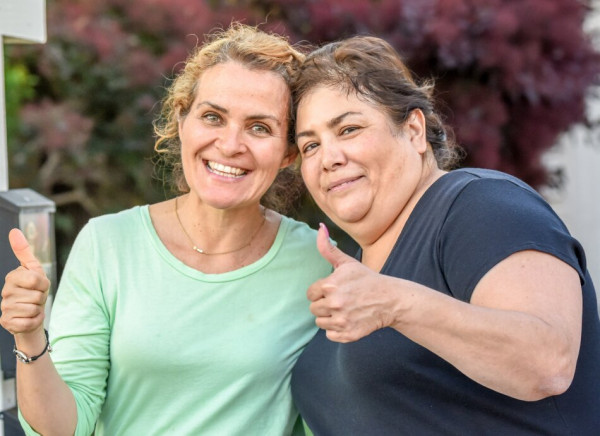You can now add Healthify as a preferred source on Google. Click here to see us when you search Google.
Health coaches
Key points about health coaches (HCs)
- Health coaches are a non-registered workforce. They work within a clearly defined scope of practice.
- Health coaches support you to gain the knowledge, skills, tools and confidence to be informed, active participants in your own health care.
- HCs are based in general practice (GP clinics) and they provide support and information in keeping with the practice team's advice and guidelines.
- Health coaches walk alongside you providing continuity of care. They support you to self-manage, improve your connection with the clinical team, find resources and services, and become more confident in making behaviour changes.
- Health coaches provide a free service.

Health coaches are a part of the wellbeing or integrated primary mental health and addiction (IPMHA) team in most general practices in Aotearoa New Zealand. They work closely with the health improvement practitioner (HIP) and other members of the general practice team to support you to meet your health and wellbeing needs.
Health coaches come from a variety of backgrounds, and work with people experiencing issues that impact on their health and wellbeing. While some health coaches have a clinical background, others may have lived experience. They sit beside you as a peer or equal.
Health coaching is based on the saying that ‘if you give a person a fish, they will eat for a day, but if you teach them to fish, they will eat for a lifetime’. The purpose of health coaching is to:
- help you understand your clinical team’s advice
- find out how you feel about that advice
- find out what you want to do about improving your health with this advice.
The role was developed in the US and has been adapted for Aotearoa New Zealand.
Health coaching is not about somebody rescuing you, it’s about being given the resources to help yourself. Rescuing is appropriate for acute care situations when healthcare providers need to take over and do something, or tell you what to do. However, if you have an ongoing health issue, rather than someone telling you what to do, a health coach works alongside you so you can manage your condition well through long lasting behaviour (lifestyle) changes.
A health coach is there to:
- inspire confidence in you
- help you navigate resources and knowledge related to your long-term health conditions
- support you with creating action plans (based on healthy eating, physical activity, medicines, stress management)
- provide continuity of care by following up with you in person, by phone or with a virtual (telehealth) session
- encourage you to take responsibility and to find ways of solving problems as they understand how making changes can be challenging
- help you to work more closely with your clinical team (nurses and doctors) by:
- accompanying you as a support person during your consultation
- helping you set an agenda (a short list of topics you need to discuss with your healthcare provider) before your appointment, so you can make the most of your time with them.
They can also help to connect you with other services such as health improvement practitioners (HIPs), Awhi Ora, Green Prescription, self-management education or mindfulness courses.
Health coaches may also be able to help you understand your health conditions better, the importance of taking your medicines properly, and can help you understand why your healthcare provider recommended you take certain actions. They will help you decide what you want to work on and will help you find the support to do that. Health coaches are empathetic, caring, and led by you. Sessions with them usually last 20 to 30 minutes.
5 roles of a health coach
Health coaches have the following roles:
Self-management support
- Empowering you with tools and skills to manage your health.
- Building your confidence to be able to make behaviour changes
Being a bridge between you and your healthcare providers
- Acting as a liaison person.
- Making sure you understand your care plan.
- Providing cultural and language support as needed.
Navigating the healthcare system
- Connecting you with resources.
- Organising support.
- Making sure your voice is heard.
Providing continuity of care
- Being the person to see you in follow-up sessions.
- Becoming familiar so you can trust them.
Having empathy
- Getting to know you and your whānau.
- Encouraging you to talk about emotions with appropriate supports.
- Being an active listener.
Video: What is a health coach?
(Listening to Families, NZ, 2023)
Health coaches can help you with any ongoing health problem including long-term conditions such as:
- diabetes
- high cholesterol
- high blood pressure
- weight loss
- gout
- asthma
- sleep problems
- low mood
- depression
- anxiety
- smoking cessation
- chronic pain.
A health coach can connect you with a health improvement practitioner (HIP) for more support with mental health, addiction and/or behaviour change. Health coaches also focus on prevention and can work alongside you if you have prediabetes or want to work on creating healthy habits.

Image credit: Canva
Many general practice teams in Aotearoa New Zealand include a health coach. They are available to anyone who wants to see them at no cost (free). Your GP, nurse or receptionist can arrange for you to have an appointment with them, but you must be an enrolled patient at your practice to access the health coaching service. Health coaches offer both booked and walk in sessions.
Ask at your general practice to see if they have a health coach or find a health coach by entering your address into this Healthpoint search page(external link).
What a health coach session is
A health coach session consists of the HC:
- introducing themselves to you
- giving you a brief explanation of their role and scope
- asking consent from you to make sure you would like to engage with the session today
- completing a wellbeing questionnaire with you
- asking you about your health condition, results (eg, in relation to diabetes, cholesterol, etc) your goals (numbers to work towards) and providing information you may need
- supporting you to create an action plan (a small specific behaviour change)
- connecting you with other services as needed
- providing some resources to take away as needed
- booking a follow up session.
What a health coach session is not
- Health coaches don't provide specific meal or exercise plans – they're not nutritionists or dietitians.
- Health coaches don't provide clinical advice – if clinical issues or questions arise (including any risks) you'll be connected back to a clinician for appropriate support.
Anyone can train to work as a health coach. Health coaches are not currently registered as health practitioners, however, pathways are being established for health coaches to be associate or full members of HCANZA (Health Coach Australia and New Zealand Association).
Health coaches receive specific training through the’ The Health Coach for Wellbeing’ course provided by Total Healthcare or the Health Literacy NZ programme.
- Health coach trainees complete initial classroom-based training – in this case, 5 days. At this time they're instructed in the health coach competencies and are observed role-playing each competency and given feedback.
- They then have 1 to 2 days of in-practice shadowed experience, when the role is introduced into the practice team and the trainee is assessed against the core health coach competencies.
- This is followed by 3 to 6 months of combined webinars and peer review supervision, and another 1 to 2 days of shadowed practice.
- Training is complete when the trainee is assessed as meeting or exceeding all competencies.
- Health coaches are always learning and developing through professional development.
Overview of health improvement practitioners, health coaches and awhi ora(external link) Tū Whakaruruhau Auckland Wellbeing Collaborative, NZ
This is what we mean when we talk about health coaching(external link) New Zealand Doctor, 2023
Share your experience
If you want to provide feedback about your experiences working with a health coach (or HIP or Awhi Ora) you can do so through the Tū Whakaruruhau website(external link).
References
- Schwarz SK. Adding a health coach to your team(external link). Clinical Practice Today. 2015 Aug:7.
- Bennett HD, Coleman EA, Parry C, Bodenheimer T, Chen EH. Health coaching for patients with chronic illness(external link) Fam Pract Management 2010 Sept/Oct:24–29
- Wellbeing services in general practice (GP)(external link) Access and Choice, Health New Zealand | Te Whatu Ora, NZ
- Health coaching(external link) Te Pou, NZ
- Te Tumu Waiora – the integrated primary mental health and addiction model(external link) New Zealand Doctor, 2021
- Te Tumu Waiora – three years on(external link) New Zealand Doctor, 2023
- This is what we mean when we talk about health coaching(external link) New Zealand Doctor, 2023
See our page health coaching for healthcare providers
Credits: Healthify editorial team. Healthify is brought to you by Health Navigator Charitable Trust.
Reviewed by: Roselyn Singh, Health Coach, Auckland
Last reviewed:





